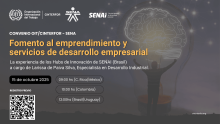Promoting Entrepreneurship and Business Development Services: The Experience of SENAI’s Innovation Hubs (Brazil)
On Wednesday, 15 October, the ILO/Cinterfor held the second webinar in its series on entrepreneurship and innovation, entitled “Promoting Entrepreneurship and Business Development Services: The Experience of SENAI’s Innovation Hubs (Brazil)”, presented by Larissa de Paiva Silva, Industrial Development Specialist at SENAI – National Department. The opening and moderation were conducted by Fernando Casanova (ILO/Cinterfor).
De Paiva outlined the three mechanisms through which SENAI drives industrial innovation: the Innovation Platform for Industry, the Innovation Hubs, and the Innovation Habitats. The Platform —a funding and support mechanism that has operated continuously since 2004— has mobilised more than R$ 1.4 billion across over 1,500 projects with industrial alliances and more than 900 productivity consultancies. In 2025 alone, more than R$ 460 million have already been committed. “We have been supporting industrial innovation projects in Brazil for more than 20 uninterrupted years,” the specialist emphasised.
The Innovation Hubs operate as open innovation spaces that connect the industry’s “pain points” with start-up solutions, combining infrastructure, mentoring, and active resource mobilisation. The UPLAB (SENAI São Paulo) case illustrates the model’s potential: 87 resident start-ups and 22 open innovation projects carried out in 2024, in a dynamic co-working environment with rotating workstations that keeps the space “alive” and fosters the natural emergence of projects. For De Paiva, success rests on two key ideas: “Connection and solving real problems: the two factors that make a hub work.”
The Innovation Habitats take collaboration a step further through the co-location of large companies within SENAI’s applied research institutes. They offer dedicated rooms, access to cutting-edge laboratories —for instance, the largest metal 3D printer in Brazil— and work with teams of highly qualified masters and PhD-level researchers. Companies commit to investing in projects throughout the partnership period. There are currently 15 habitats, involving more than 90 partner industries, over 130 ecosystem connections, 100+ ongoing projects, and R$ 180 million committed. “A habitat brings together everything an industry needs to innovate: space, laboratories, talent and networks,” summarised De Paiva.
Among the notable cases, Bunge is developing four projects with the Florianópolis habitat and is already transferring technologies developed in Brazil to its European plants. In the Paraná habitat, where Bosch has established its applied research centre, an accelerator operates with over 50 graduated start-ups, more than 250 mentored, and over 20 open innovation programmes; in 2024, these start-ups exceeded R$ 60 million in turnover and generated more than 350 jobs. One particularly interesting practice linking education and innovation is the coexistence of postgraduate classrooms and laboratories: students’ final projects are integrated into real industrial projects, facilitating employment transitions.
During the Q&A session, De Paiva explained that costs and intellectual property arrangements vary by state (federal model). In general, industries pay a fee for space use and commit to project investment, while start-ups pay smaller amounts for access to shared areas. SENAI prioritises supporting industry and does not compete for intellectual property ownership when companies request greater participation, with clauses negotiated on a case-by-case basis. Promotion takes place through active outreach, dedicated websites, and the Innovation Platform as a key showcase. Regarding consolidation timelines, the hubs emerged 6–8 years ago, and many habitats accelerated during the pandemic by repurposing unused spaces. As advice, De Paiva recommended assessing local demand, starting with hubs (which require less physical investment), and partnering with organisations that already have laboratories. “It is easier to start with hubs and work with partners than to invest upfront in large laboratories,” she noted.
Finally, the next session in the series was announced: a presentation by SENATI (Peru) focusing on innovation and incubation ecosystems, scheduled for 29 October at the usual time.





